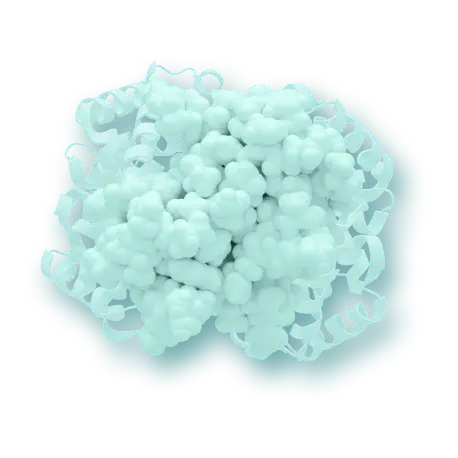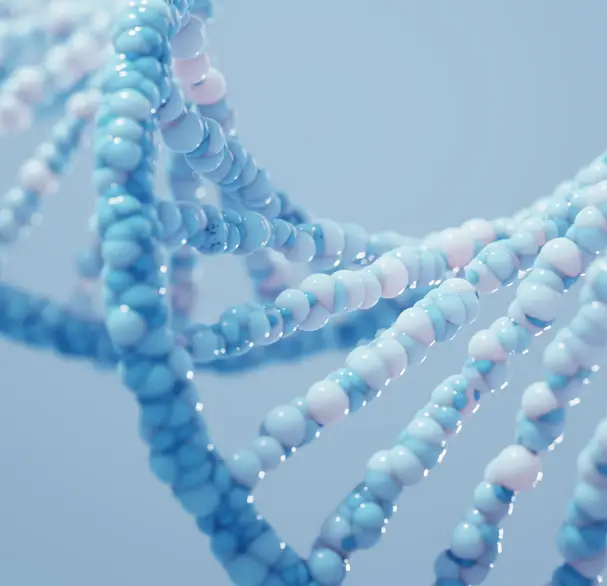About
Lynch Syndrome
Lynch syndrome, also known as inherited mismatch repair (MMR) deficiency, is a hereditary condition that increases the risk of many types of cancer. What causes Lynch syndrome, how do patients get tested, and what does a positive diagnosis mean?
1
in
279
People have Lynch syndrome1
Lynch syndrome is inherited with 50% probability2 within affected families. Individuals with inherited MMR deficiency have an up to 80% risk of developing cancer3 and at a significantly younger age than the general population.


With an estimated 1 in 279 people of the world’s population being affected by Lynch syndrome, there are millions of people under a highly increased risk for cancer.


With an estimated 1 in 300 people of the world’s population being affected by Lynch syndrome, there are millions of people under a highly increased risk for cancer.
Where does Lynch syndrome come from?
As cells grow and make new cells as part of their lifecycle, they make copies of their DNA. Sometimes the copies have errors. The body has a set of proteins that hold the instructions for finding the errors and fixing them. These proteins are called mismatch repair (MMR) proteins.
People with Lynch syndrome have mismatch repair proteins that don’t work as expected. If an error happens in the DNA, it might not get fixed. This could cause cells that grow out of control and become cancer cells.
Cell Division
When cells divide, their DNA is replicated and separated into two daughter cells.
DNA Mismatch Repair
Possible mistakes in the replication process are usually detected and repaired by mismatch repair proteins.
DNA Mismatch Repair Deficiency
In people with Lynch syndrome, this mechanism is deficient.
Cells Divide & Errors Accumulate
As cells continue to divide, errors persist in the DNA copies and accumulate, increasing the risk of cancer.
Lynch syndrome is the
#1 cause of hereditary cancers4
Lynch syndrome is a genetic condition caused by mutations in specific genes, such as MLH1, MSH2, MSH6, PMS2, and EPCAM. These mutations create a heightened susceptibility to certain cancers, notably colorectal and endometrial, and extend to encompass a spectrum of others, including ovarian, stomach, and urinary tract cancers.
Lynch syndrome is inherited in an autosomal dominant manner, meaning an affected individual has a 50% chance of passing the genetic mutation to each of their children. This hereditary pattern transcends generations, making it vital for families to be aware of their genetic predisposition.
Lifetime cancer risks for people with Lynch Syndrome5:
- Colorectal cancer: 20-80%
- Urinary tract cancer: 1-18%
- Small bowel cancer: 1-6%
- Pancreatic cancer: 1-6%
- Endometrial cancer: 15-60%
- Ovarian cancer in women: 1-38%
How is Lynch syndrome diagnosed?
Current Lynch syndrome diagnosis relies heavily on tumor studies and genetic testing. DNA sequencing can determine if an individual carries a heritable mutation in a gene associated with Lynch syndrome. Testing is available for the MLH1, MSH2, MSH6, PMS2, and EPCAM genes.
However, it’s estimated that only 30-40%6-7 of individuals will have an identifiable mutation in one of those genes, and there is an entire universe of genomic variants that could indicate Lynch syndrome that we don’t know about yet. The challenges to variant interpretation in genetic testing can be avoided with a new way of testing for Lynch syndrome: testing for MMR deficiency. This quantitative method allows for Lynch syndrome diagnosis based on a minimally invasive tissue sample before the person has developed any cancer, without the knowledge and details of an inherited mutation. It produces conclusive and actionable results with 100% specificity and high sensitivity and accuracy,6 improving the ability to identify individuals and families with Lynch syndrome.
2 million
cancer cases should
be tested every year
Early detection of Lynch syndrome is fundamental against the development of cancers. The earlier individuals can be tested, the earlier they can start a valuable path of prevention strategies and lifestyle changes. Because Lynch syndrome is inherited, families should also be tested for Lynch syndrome.





SOURCES
1.https://www.ncbi.nlm.nih.gov/pmc/articles/PMC6333561/ 2. https://www.cdc.gov/genomics/disease/colorectal_cancer/family_history_lynch.htm 3. https://www.ncbi.nlm.nih.gov/pmc/articles/PMC9889410/ 4. https://www.ncbi.nlm.nih.gov/pmc/articles/PMC4142571/ 5. https://www.cancer.net/cancer-types/lynch-syndrome
6. https://pubmed.ncbi.nlm.nih.gov/24362816/ 7. https://pubmed.ncbi.nlm.nih.gov/24493211/


